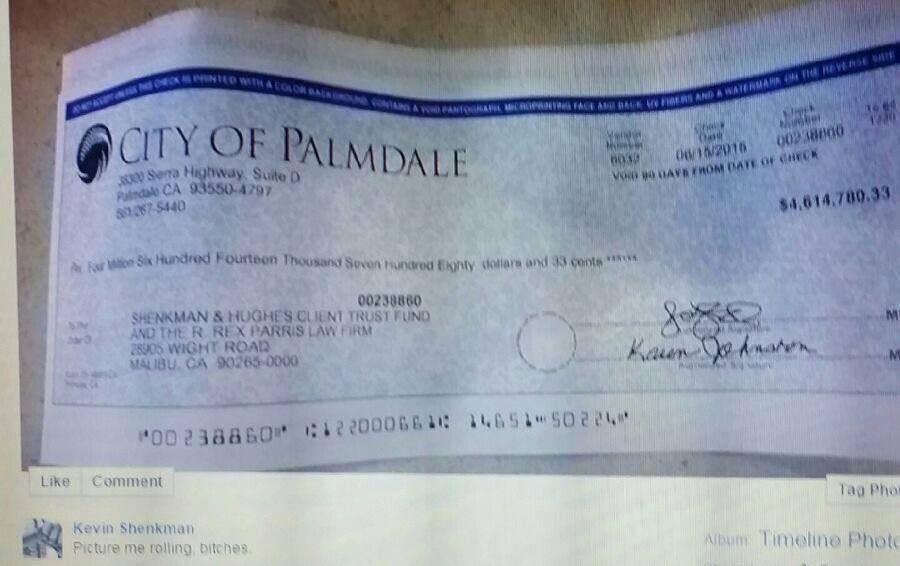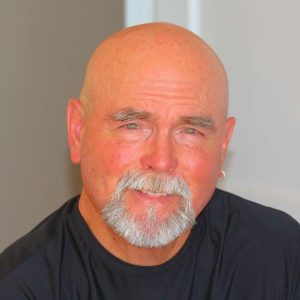South San Francisco, CA March 19, 2018 by Mel Ellison, ESC Correspondent

Mr Shenkman has become a very wealthy man….on the taxpayer dime. Photo:Robin Abcarian/Los Angeles Times
There is a big change coming in the way we vote in South San Francisco and apparently neither the voters, nor city officials can do much about it. The wheels of government move at a glacial pace and the change may take a year or two to be implemented, but it will happen: South San Francisco will no longer have “at large” voting for City Council…ie, every resident may vote for any candidate….but will incorporate district voting where each district or neighborhood will vote for their own candidate. The reason this will happen is that the City of South San Francisco is in receipt of a letter from attorney Kevin Shenkman, representing the SVREP (Southwest Voter Registration Project), that threatens to seek “judicial relief” if the City does not agree to the change by April 20th.
The basis for this all this is the CVRA (California Voting Rights Act) passed in 2002. As reported in the LA Times, “For the past several years Shenkman, who lives and works in Malibu, has been suing, or threatening to sue, cities all over Southern California, demanding they change the way they elect members of their city councils in order to increase the numbers of African-American and Latino representatives.” Beginning in Southern California, and using the CVRA as a legal “hammer”, Shenkman has been suing cities all over the State of California…and one by one almost every city has either complied…or as in the case of South San Francisco, will comply. One city, Palmdale, decided early on to fight back and after a three year heated court battle lost and not only had to change to district voting, but under the CVRA, had to reimburse Mr. Shenkman for his legal costs to the tune of $4.7 million. No city wants to gamble on that kind of financial loss…and as Councilman Addiego has indicated to us, SSF is no exception.

Photo source: Community Common Sense as pulled from FB
Mr Shenkman, once an aspiring heavy weight boxer that belies his almost nerdish look, had this to say after the Palmdale settlement, “Not only will Palmdale have fair and inclusive elections, but other cities will look to Palmdale as an example of what happens if they refuse to comply with the California Voting Rights Act.” Even if a city doesn’t agree about the benefits of district elections, making the change is an easy choice when faced with the likely possibility of incurring enormous legal fees.
However it does seem a little disingenuous of Mr Shenkman to threaten a law suit against the City of South San Francisco…a city whose 5 member City Council is comprised of two Asians-Americans who are female, one of which is the current Mayor and who replaced a retiring Pedro Gonzales, a three term Latino Councilman and former Mayor, two Italian-Americans, and a native of India who migrated to this country some 50 years ago. As is often the case in life, “one size fits all” doesn’t always apply. It’s also worth noting that, for all of his legal maneuvering, Mr Shenkman has become a very wealthy man….on the taxpayer dime.
As for the SVREP, the organization that Mr Shenkman represents, it was founded in 1974 and is the largest and oldest non-partisan Latino voter participation organization in the United States. Their stated mission is to, “Empower latinos and other minorities by increasing their participation in the American democratic process.” In our City and in many others around the State, it’s often difficult to find anyone to run, much less a minority candidate. SVREP’s position is that district elections offer minority candidates a much better opportunity to be elected and therefore more minority candidates will be available and willing to run.
Running for City Council can be a daunting and often thankless pursuit, whether at- large or by district. One such person who has recently stepped up here in SSF is Mark Nagales, the only declared non-incumbent candidate thus far in the upcoming race for a seat on the City Council. When I contacted Mark for this article, he told me that, “I favor any election method that increases voter engagement and awareness. Like all elections, voters must do their due diligence on the issues affecting our community. Candidates must represent the interests of residents they serve, regardless if it’s city- wide or district elections. It should be hard [ his emphasis] for anyone who wishes to run for elected office, as they have to prove to voters why they should receive your vote.”
*A February 27, 2018 press release from San Mateo Harbor District commissioners Sabrina Brennan and Edmundo Arenas called for district elections and, in an email response sent to ESC, local resident Michael Baker said, “I petitioned the SSF City Council for district elections two years ago. My request was ignored. SSFUSD had a presenter from the Valley do an evening power point show 3 years ago as I recall. SSFUSD has not taken any action to move this forward either. I also advocated for two year terms.” To an ESC Facebook post on the same topic, another local resident, Jim Chazer commented, ““District elections are what ruined San Francisco. Please don’t let it happen here.”
Retired ICU nurse Sharon Tobin, another local neighbor also weighed in “I have given it a lot of thought over the last few days and did my research. It is my opinion that as a growing comunity, I think the change to district voting is a step in the right direction. I note that several members of our council have been members for a very long time. As we grow and change as a community, it is vitally important that all voices from all neighborhoods are heard. I think a change to district voting will facilitate that communication.” {edit update}
In a formal statement, Mayor Normandy assures that at a meeting in April, the Council will consider whether to shift to district elections….and that at that meeting, residents will be “…afforded an opportunity to provide input on whether to change to district elections.” The statement goes on to say, “The City will publish well in advance, notice of the specific date, time, and location of the City Council meeting where this issue will be discussed.” In a personal email to me she asked that I “…highlight my commitment to ensure all our residents have the opportunity to participate in the future elections.”
According the letter sent by Mr Shenkman, the City has until April 20th to either agree to the change or be taken to court. One thing is almost certain: South San Francisco voters will…sooner or later….be electing our council members by district. They only other alternative is for a change to the CVRA on a State level and in the unlikely event that occurs, how difficult and costly will it be for South San Francisco and other California cities to revert back to at-large voting if the voters so choose?
*Updated 10am 3.20.2018
###

Mel Ellison is a free-lance writer and photographer who covers special features for Everything South City as well as taking the role of co-admin on our social media. Married to Lynn Brunetti, they enjoy family time with their grandchildren and enjoying their Brentwood neighborhood in South San Francisco. When not dazzling us with his photography you will find Mel on the open seas pursuing his love of sailing or creating music as he is also an accomplished musician.
To view more of Mel’s photography and travels follow him on FACEBOOK HERE To see a partial collection of photos taken for Everything South City CLICK HERE If you are interested in purchasing any of Mel’s fine art, please CLICK HERE
nice write up Mel, thanks
[…] California based attorney Mr Shenkman to our City as described by ESC correspondent Mel Ellison { CLICK HERE to read more} Community members voiced split opinions on moving to district elections from our […]
Not that many people run for council for this to be an issue. Am I missing something?
The Mercury News, March 20, 2018— Joaquin Avila’s fight to empower poor communities arose through his own experience growing up in the tough neighborhoods of Compton, a community primarily composed of African Americans and Latinos in south-central Los Angeles. In 1966, he graduated from Centennial High School as class valedictorian and went on to become one of the first Chicanos to graduate from Yale University in 1970 and Harvard Law School in 1973.
He joined the Mexican American Legal Defense and Education Fund (MALDEF) in 1974. He successfully challenged discriminatory voting systems across the state of Texas. His leadership quickly led him to MALDEF’s top position as president and general counsel in 1982.
Three years later, Avila opened his own private voting rights office. He took on the landmark case of Gomez v. City of Watsonville. Three Latino plaintiffs and Avila claimed that the at-large elections system was unconstitutional and violated the federal Voting Rights Act of 1965. At the time, Latinos in Watsonville made up half of the city’s population but had never elected a single Latino to the City Council.
The plaintiffs further contended that the at-large system unlawfully diluted the minority vote and unfairly disenfranchised Latinos due to the long history of racially polarized voting.
District elections, on the other hand, would divide Watsonville into geographic districts in which each would vote for its own representative. Avila argued that districts would give a stronger voice, more cohesion and increased voting power to Latinos.
Link to article: https://www.mercurynews.com/2018/03/20/opinion-voting-rights-advocate-reshaped-california-politics/
Thanks for this Mel. A very informative article about an important topic.
I wonder why Hispanics, in particular, are so sparse in the voting booths around the state? They (Or we…My grandfather was Hispanic) certainly enjoy a major portion, if not the majority, of our California population.